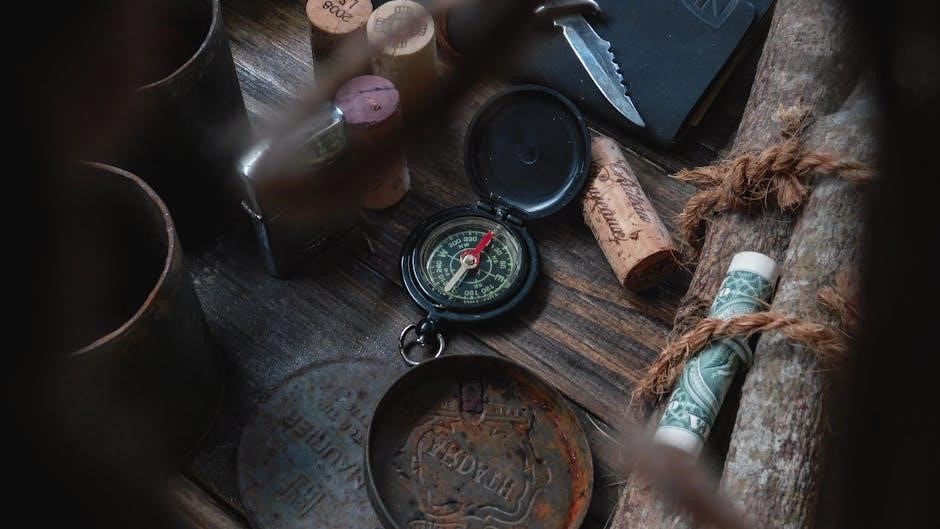Embark on a dark adventure in the undead nation of Geb, ruled by the enigmatic Ghost King․ Blood Lords offers a unique experience as undead citizens, blending horror and intrigue in a world of political strife and ancient mysteries․ Players craft characters steeped in the culture of death, exploring themes of power, loyalty, and the undead condition․ This campaign setting promises a rich narrative and strategic gameplay for those who dare to embrace immortality․
Overview of the Campaign Setting
Blood Lords is set in the eerie nation of Geb, a land dominated by undead creatures and ruled by the enigmatic Ghost King․ This dark, gothic-inspired world is steeped in political intrigue, ancient mysteries, and the struggle for power among immortal beings․ Players take on the roles of undead citizens, navigating a society where death is not an end but a beginning․ The campaign setting blends horror, strategy, and role-playing, offering a unique experience where characters must balance their undead nature with the demands of a decaying world․ The Blood Lords Players Guide provides tools and insights to craft characters that thrive in this haunting, morally complex environment․
Key Themes and Tone of the Game
Blood Lords delves into themes of immortality, power, and moral ambiguity, set against a backdrop of gothic horror and political intrigue․ The game explores the complexities of undead existence, where characters must navigate the blurred lines between life and death․ The tone is dark and foreboding, with a focus on strategic gameplay and deep role-playing․ Players confront the consequences of their choices in a world where death is not an end, but a transformation․ The Blood Lords Players Guide emphasizes these themes, offering tools to craft characters grappling with their undead nature and the weight of eternal ambition in a decaying, yet vibrant, world․
Why Play Blood Lords?
Blood Lords offers a unique blend of dark fantasy and strategic gameplay, set in the undead nation of Geb․ Players take on the roles of immortal beings, navigating political intrigue, ancient curses, and the complexities of undead existence․ The game’s tone is deeply atmospheric, combining gothic horror with rich storytelling, making it a standout experience for fans of immersive role-playing․ By exploring themes of power, loyalty, and the blurred lines between life and death, Blood Lords provides a fresh perspective on traditional fantasy settings․ It’s an ideal choice for those seeking a challenging and narratively rich adventure that pushes the boundaries of conventional RPGs․
What to Expect as a Player
As a player in Blood Lords, expect a immersive journey through the dark, gothic world of Geb, where political intrigue and ancient curses shape your destiny․ You’ll take on the role of an undead citizen, navigating the complexities of immortal life under the Ghost King’s rule․ The game offers a mix of strategic combat, exploration, and social manipulation, with a strong emphasis on storytelling and character development․ Players will encounter moral dilemmas, forge alliances, and uncover secrets that challenge their understanding of the world․ With its rich narrative and deep gameplay mechanics, Blood Lords promises a unique and unforgettable experience for those who embrace the shadows․

Character Creation Basics
Begin by selecting your race, class, and background, shaping your undead identity․ Customize abilities, equipment, and appearance, balancing power and lore․ Craft a unique legacy in Geb, blending strategy and storytelling seamlessly․

Choosing Your Race
In Blood Lords, selecting your race is crucial, as it defines your undead nature and abilities․ Races like Vampires, Liches, and Ghouls offer unique traits, such as charisma, necromancy, or stealth; Each race has distinct lore, aligning with Geb’s dark, gothic world․ Vampires thrive on blood and manipulation, while Liches wield immense magical power․ Ghouls excel in survival and scavenging․ Your race shapes your playstyle, interactions, and story․ Consider how your race’s abilities and background fit your character’s vision․ This choice is foundational, influencing your journey in Geb’s shadowy realm․ Choose wisely to embrace your undead legacy․
Selecting Your Class
Selecting your class in Blood Lords is a pivotal decision that shapes your undead character’s abilities and playstyle․ Classes like the Necromancer, Vampire Lord, or Wight offer distinct powers tied to death, manipulation, or brute force․ Each class comes with unique abilities, such as summoning undead minions or dominating enemies․ Your class defines your role in the party and how you interact with Geb’s dark world․ Consider your preferred playstyle: do you want to command armies, manipulate minds, or crush foes with raw power? Align your class choice with your character’s lore and ambitions to craft a compelling undead legend․ This decision will guide your journey through the shadows of Geb․
Background and Personality
Your undead character’s background and personality are crucial in Blood Lords, defining their motivations, fears, and interactions․ Choose a background that reflects their life before undeath, such as a noble betrayed, a warrior slain in battle, or a sorcerer consumed by ambition․ Personality traits like cunning, ruthlessness, or melancholy add depth, shaping how they navigate Geb’s treacherous world․ Undead characters often struggle with their cursed existence, offering rich role-playing opportunities․ Consider how their personality influences relationships with allies and enemies, as well as their response to the curse of undeath․ A well-crafted background and personality will make your character unforgettable in this dark, gothic setting․

Equipment and Starting Gear
In Blood Lords, your undead character begins with basic gear suited to their cursed existence․ Starting equipment includes tattered armor, rusted weapons, and perhaps a few cryptic items tied to their past life․ Choose gear that aligns with your character’s background and playstyle, such as a noble’s sword or a necromancer’s staff․ As you progress, you’ll uncover powerful artifacts like cursed jewelry or spectral weapons, each with unique abilities and drawbacks․ Equipment choices are vital, as they define your character’s combat effectiveness and role-playing opportunities․ Earned through quests or plundered from enemies, your gear will reflect your undead character’s dark journey and the harsh world of Geb․

The World of Geb
Geb, a land of eternal twilight, is ruled by the Ghost King, where death reigns supreme․ This dark, gothic world is filled with necromancers, undead creatures, and cursed lands․ The air is thick with the stench of decay, and the skies are perpetually shrouded in a deep, eerie haze․ Ancient ruins, haunted forests, and crumbling cities dot the landscape, each holding secrets and dangers․ The world is alive with dark magic, and the whispers of the dead echo through the desolate terrain․ Geb is a place where death is not the end but a new beginning․
Geography and Notable Locations
Geb is a vast, foreboding land dominated by death and dark magic․ The Crimson Wastes, a desolate expanse of bloodstained sands, stretch endlessly, dotted with skeletal remains․ The Blackreach Forest looms with twisted, corpse-like trees, home to malevolent spirits․ The Spire of the Ghost King pierces the sky, a towering necropolis and seat of the ruler’s power․ Other notable locations include the Necropolis of the Forgotten, where restless souls wander, and the River of Shadows, which flows with the essence of the departed․ Each region is steeped in dark history, offering eerie landscapes and deadly challenges for adventurers․
Political Factions and Power Struggles
Geb is a realm of constant intrigue, dominated by powerful factions vying for control․ The Ghost King’s court holds absolute authority, but internal rivalries simmer among his undead lieutenants․ The Necromancer Guilds wield significant influence, manipulating events from the shadows to expand their dark magical prowess․ The Cult of the Black Depths, a mysterious organization, seeks to summon ancient evils to reshape the world․ Meanwhile, the Vampiric Clans plot to overthrow the Ghost King, desiring dominion over Geb themselves․ These power struggles create a volatile landscape, with alliances forged and broken in the pursuit of eternal power, leaving adventurers caught in the crossfire․
The Role of the Ghost King
The Ghost King is the supreme ruler of Geb, a powerful undead monarch whose dominion is both feared and revered․ His rule is absolute, maintained through a combination of dark magic, fear, and the loyalty of his undead armies․ The Ghost King’s will shapes the world of Geb, with his decrees influencing everything from the balance of power among factions to the fates of individual adventurers․ His true motives remain shrouded in mystery, but his desire to maintain control over the land of the dead and the living is clear․ Players must navigate the intricate web of his influence, as crossing the Ghost King often leads to dire consequences․
Cultural Norms and Social Dynamics
In the world of Geb, cultural norms are shaped by the blending of the living and the dead, creating a unique social hierarchy․ Undead beings hold significant influence, while the living are often viewed with suspicion or curiosity․ Social dynamics revolve around power and survival, with alliances forming and breaking based on mutual interests․ The feudal structure of Geb emphasizes loyalty to one’s lord or faction, with betrayal punished severely․ Trust is scarce, and deception is common, fostering a climate of tension and intrigue․ Players must navigate these complexities, as cultural expectations and social interactions deeply impact their characters’ experiences and relationships in this unforgiving world․

Gameplay Mechanics
Blood Lords combines d20-based combat, skill checks, and strategic character customization․ The game emphasizes tactical thinking, resource management, and leveraging undead abilities, blending horror and strategy seamlessly․
Core Rules and Systems
Blood Lords operates on a d20-based system, emphasizing strategy and resource management․ Core mechanics include action economy, skill checks, and combat maneuvers․ Character creation involves selecting races, classes, and backgrounds, each with unique traits and abilities․ The game incorporates a corruption system, where undead powers come with moral and mechanical costs․ Players must manage resources like health, stamina, and necrotic energy to survive․ Combat is turn-based, with initiative and positioning playing critical roles․ Skill checks and ability scores determine success in non-combat scenarios, blending role-playing and mechanics seamlessly․ The system rewards tactical thinking and creativity, ensuring a dynamic and immersive experience․
Combat Strategies and Tactics
In Blood Lords, combat demands a blend of cunning and brute force․ Players must master their undead abilities, leveraging curses, necrotic powers, and terrain to outmaneuver foes․ Positioning is critical, as melee combatants shield spellcasters while ranged attackers soften enemies from afar․ Managing corruption levels is vital; excessive use of dark powers risks severe penalties․ Coordinate with allies to exploit enemy weaknesses, focusing on high-priority targets․ Use abilities like fear auras or summons to control the battlefield․ Adaptability is key, as each encounter requires adjusting tactics based on enemy resistances and the environment․ Victory often hinges on clever resource management and strategic decision-making․
Using Skills Effectively
Mastering skills is essential for success in Blood Lords․ Each skill reflects your character’s expertise, influencing interactions, exploration, and combat․ Proficiency in skills like Intimidation or Stealth can reshape encounters, allowing you to avoid or dominate foes․ Skill checks often determine mission success, so investing in relevant abilities is crucial․ Combine skills creatively, such as using Perception to detect ambushes or Persuasion to manipulate NPCs․ Expertise feats can enhance proficiency, making you exceptionally skilled in key areas․ Always consider your character’s role and playstyle when selecting skills, ensuring they align with your undead or living nature․ Effective skill use elevates your impact in both combat and role-playing scenarios․
Role-Playing and Storytelling
Role-playing and storytelling are at the heart of Blood Lords, offering a rich narrative experience․ Players are encouraged to craft deep, complex characters, exploring their motivations, fears, and desires․ The game’s dark, gothic atmosphere provides a backdrop for tragic tales of undead existence and mortal ambition․ Collaborate with your GM to weave your character’s story into the larger world of Geb, creating unforgettable moments․ Embrace the moral ambiguity of your actions, as choices have lasting consequences․ The curse of undeath adds layers of intrigue, allowing for compelling role-playing opportunities․ Storytelling in Blood Lords is a shared journey, blending personal narratives with the game’s eerie lore to create an immersive experience․

Character Progression
Character progression in Blood Lords is a journey of power and transformation, blending dark fantasy elements with strategic growth․ Unlock new abilities, enhance undead traits, and master your role in Geb’s shadowy world, where every advancement deepens your character’s tragic yet powerful story․
Leveling Up and Ability Scores
Leveling up in Blood Lords is a pivotal aspect of character progression, allowing players to enhance their undead characters’ power and versatility․ As characters gain experience points through completing quests, defeating enemies, or exploring the world of Geb, they earn levels that unlock improvements to their ability scores․ These scores define a character’s strengths and weaknesses, with undead traits often influencing how abilities develop․ Each level also provides opportunities to refine skills or acquire new feats, ensuring a customizable growth path․ The Ghost King’s influence may even grant unique bonuses or penalties, tying progression to the game’s dark narrative․ Balancing ability growth with thematic consistency ensures a compelling and immersive experience․
Feats and Special Abilities
Feats and special abilities in Blood Lords are key components that define your undead character’s unique capabilities and playstyle․ Feats are powerful enhancements that can be unlocked as you progress, granting access to extraordinary talents such as dark magic manipulation, enhanced undead resilience, or supernatural combat techniques; Special abilities often tie into your character’s race, class, or background, offering unique mechanics that set your character apart․ For example, a vampire might gain heightened senses, while a lich could master devastating necromantic spells․ These abilities not only enhance gameplay but also deepen your character’s connection to the dark, gothic world of Geb, making each undead character feel distinct and memorable․
Prestige Classes and Advanced Options
Prestige classes in Blood Lords offer advanced playstyles for undead characters, unlocking powerful, specialized abilities tied to Geb’s dark lore․ For example, the Eternal Knight prestige class allows vampiric warriors to master both martial prowess and blood magic, while the Cursed Archon transforms liches into masters of necromantic domination․ These classes often require specific prerequisites, such as certain feats or racial traits․ Advanced options also include unique undead archetypes, like the Phantom Assassin or Deathless Oracle, which further refine your character’s role in the party․ Prestige classes and advanced options provide depth and customization, allowing players to craft undead champions that stand out in both power and theme;

Death and Resurrection Mechanics
In Blood Lords, death and resurrection are uniquely tied to the undead nature of characters․ When an undead character “dies,” their essence returns to their lair, where they reform over time․ However, each death carries a cost, such as the loss of temporary hit points or the corruption of equipment․ Resurrection is not guaranteed and often requires powerful magic or sacrifices․ The GM may impose narrative consequences, such as increased servo undeath or the weakening of the character’s connection to their past life․ This system emphasizes the fragility of undeath, balancing immortality with vulnerability and creating a strategic layer to survival․ Resurrection is a double-edged sword, as it sustains existence but deepens the curse․

Tips for New Players
Start with simple builds, focus on core mechanics, and immerse yourself in the game’s dark, gothic world․ Engage with the story and role-play your character’s curse․
Getting Started with Blood Lords
Begin by reading the core rulebook to understand the game’s mechanics and unique twists․ Choose a race and class that align with your playstyle, considering their abilities and lore․ Craft a character with a compelling backstory and personality to enhance role-playing․ Familiarize yourself with the starting equipment and how it suits your character․ During your first session, focus on learning the basics of combat, skill checks, and interaction with the game’s dark, gothic world․ Don’t hesitate to ask your GM or veteran players for guidance․ Immerse yourself in the atmosphere and themes of Blood Lords to fully enjoy the experience․
Role-Playing as an Undead Character
Embrace the unique opportunity to play a character cursed with undeath, exploring themes of immortality, loss, and the struggle between humanity and monstrous instincts․ Develop a backstory that explains how your character became undead and what drives them now․ Consider their emotional state—are they haunted by past life memories or embracing their new existence? Interact with other characters in ways that reflect their undead nature, such as inspiring fear or mistrust․ Use the curse as a narrative tool to create tension and depth in your role-playing․ This adds richness to the story and enhances the dark, gothic atmosphere of Blood Lords․
Common Mistakes to Avoid
New players often overlook the importance of party synergy, focusing solely on individual power․ Neglecting to utilize undead abilities strategically can hinder progress․ Some underestimate the depth of character customization, leading to suboptimal builds․ Others fail to engage deeply with the game’s lore, missing out on role-playing opportunities․ Avoid ignoring skill checks and non-combat scenarios, as they are crucial for character development․ Don’t rush through decisions without considering long-term consequences․ Lastly, many players neglect to communicate effectively with their group, leading to disjointed strategies․ Learning from these mistakes will enhance your overall experience in Blood Lords․
Resources and Guides for Improvement
To enhance your gameplay, explore official Blood Lords guides and community resources․ The game’s official wiki offers detailed lore, mechanics, and strategies․ Community forums and Reddit threads share player insights and tips․ YouTube tutorials provide visual breakdowns of complex systems․ Join Discord servers for real-time advice and collaboration․ Advanced players often publish strategy guides on character builds and combat tactics․ Don’t overlook the game’s official patch notes for updates and balance changes․ Engaging with these resources will help you refine your skills and stay ahead in the world of Geb․ Utilize these tools to elevate your playstyle and master the undead experience․

Advanced Strategies
Mastering Blood Lords requires optimizing builds, leveraging undead traits, and coordinating party synergies to dominate challenges․ Experiment with multiclassing and refine combat tactics for superior results․
Multiclassing and Build Optimization
Multiclassing in Blood Lords allows for versatile, powerful characters by combining classes that complement each other․ When optimizing builds, focus on ability scores that enhance your primary and secondary roles․ For example, pairing a necromancer with a fighter can create a devastating tank-caster hybrid․ Feats should be chosen to amplify your character’s strengths, such as Undead Mastery or Bloodline Focus․ Experiment with race-class combinations to exploit unique synergies, like a vampire rogue for stealth and blood magic․ Prioritize gear that enhances your character’s abilities, ensuring a balanced yet formidable build․ Proper planning ensures your character excels in both combat and role-playing scenarios․
Mastering the Undead Playstyle
Embracing the undead playstyle in Blood Lords revolves around leveraging unique racial traits and abilities to dominate encounters․ Undead characters possess immunities to diseases and poison, making them resilient in combat․ Focus on abilities that amplify fear and curses to control battles․ Use fear auras to disrupt enemies, while necrotic powers drain life force․ Regeneration and damage resistance enhance survivability, allowing aggressive tactics․ Role-play the cursed existence by embracing the dark, immoral choices․ Mastering dark magic and necrotic powers is key to overwhelming foes․ Combine these abilities with party synergy to create devastating strategies, ensuring the undead reign supreme in Geb’s shadowed world․
Utilizing Party Synergy
Effective party synergy in Blood Lords amplifies your group’s strength by combining unique abilities․ Undead characters excel at controlling battles, while living allies provide healing and damage․ Coordinate abilities like fear auras, necrotic powers, and buffs to overwhelm foes․ Use curses to weaken enemies, allowing your party to exploit vulnerabilities․ Communicate strategies to maximize teamwork, such as focusing on high-priority targets or protecting vulnerable members․ undead and living characters can complement each other, creating a balanced and formidable team․ Experiment with ability combinations to discover powerful synergies, ensuring your party adapts to any challenge Geb throws your way․
Advanced Combat Techniques
Mastering advanced combat techniques in Blood Lords elevates your gameplay, leveraging the undead’s unique strengths․ Focus on battlefield control using curses, necrotic zones, and fear auras to manipulate enemy movements․ Coordinate with your party to exploit weaknesses, such as isolating high-value targets or creating kill zones․ Use terrain to your advantage, funneling enemies into ambushes or bottlenecks․ Manage resource-intensive abilities wisely, ensuring peak performance in critical moments․ Experiment with combo chains, such as debuffing foes before unleashing devastating area effects․ Liches and other casters can dominate battles with strategic spell placement, while melee undead thrive in close-quarters chaos․ Adaptability and foresight are key to victory in Geb’s unforgiving conflicts․
